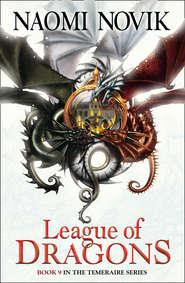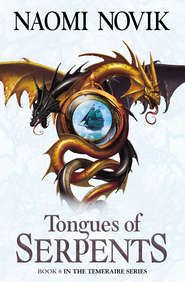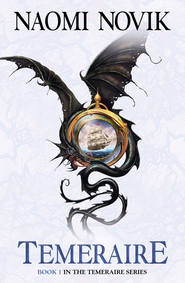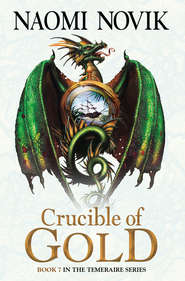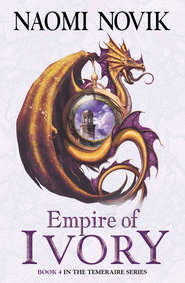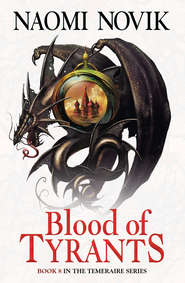По всем вопросам обращайтесь на: info@litportal.ru
(©) 2003-2024.
✖
Black Powder War
Автор
Год написания книги
2019
Настройки чтения
Размер шрифта
Высота строк
Поля
Black Powder War
Naomi Novik
Naomi Novik’s stunning series of novels follow the global adventures of Captain William Laurence and his fighting dragon Temeraire as they are thrown together to fight for Britain during the turbulent time of the Napoleonic Wars.British flyer Will Laurence and his extraordinary Celestial dragon, Temeraire, gratefully anticipate their voyage home from China. But before they set sail, they are waylaid by urgent new orders. The British Government, having purchased three valuable dragon eggs from the Ottoman Empire – one of a rare fire-breathing Kazilik dragon, one of the most deadly breeds in existence – now require Laurence and Temeraire to make a more perilous overland journey instead, stopping off in Istanbul to collect and escort the precious cargo back to England.And time is of the essence if the eggs are to hatch upon British shores.A cross-continental expedition is a daunting prospect, fraught with countless dangers. The small party must be prepared to travel the treacherous Silk Road: navigating frigid mountain passes and crossing sterile deserts to evade feral dragon attacks and Napoleon's aggressive infantry.Barely surviving the poisonous intrigue of the Ottoman Court, the small British party's journey home is delayed once more. The Prussians muster their forces before them, barring their way, and Laurence and Temeraire become swept up in the battle against Bonaparte – trapped by politics as they learn that the British had promised to send their allies aid – but help is months overdue.The crew will also face unexpected menace, for a Machiavellian herald precedes them, spreading political poison in her wake. Lien, the white celestial dragon, absconded from the Chinese Imperial Court shortly after the humiliating death of her beloved princely companion. Fervently believing Temeraire to be the architect of her anguish, she has vowed to ally herself with his greatest enemy in order to exact a full and painful revenge upon everything and everyone the black dragon holds dear.
NAOMI NOVIK
Temeraire: Black Powder War
Dedication (#ulink_b0bcc8a3-f237-599a-bdf1-a23ee0ed039b)
for my mother
in small return for many bajki cudowne
Contents
Cover (#ufcaa8717-0f65-5c2e-8ce6-dd4e357996c0)
Title Page (#u8fc210f3-73d8-5353-833b-5b3158457fb7)
Dedication (#ulink_853bc4c3-0b37-54a2-beeb-47f5762ef163)
Prologue (#ulink_1a740d29-1fb5-5ded-bd02-74eeb85b3bae)
Part I (#ulink_a7007593-ffee-5aac-8467-3d479a012774)
Chapter One (#ulink_4d7509ad-cae3-5e5b-9ec5-a7e5df15e648)
Chapter Two (#ulink_5b2edc53-71f2-5303-9f3d-9a39ed0b61df)
Chapter Three (#ulink_471ad6bb-577d-53b6-aed4-a3c3545eb2fe)
Chapter Four (#ulink_bdaaca40-caa9-52b7-a4b3-a0bdd139a3c8)
Chapter Five (#litres_trial_promo)
Part II (#litres_trial_promo)
Chapter Six (#litres_trial_promo)
Chapter Seven (#litres_trial_promo)
Chapter Eight (#litres_trial_promo)
Chapter Nine (#litres_trial_promo)
Chapter Ten (#litres_trial_promo)
Part III (#litres_trial_promo)
Chapter Eleven (#litres_trial_promo)
Chapter Twelve (#litres_trial_promo)
Chapter Thirteen (#litres_trial_promo)
Chapter Fourteen (#litres_trial_promo)
Chapter Fifteen (#litres_trial_promo)
Chapter Sixteen (#litres_trial_promo)
Chapter Seventeen (#litres_trial_promo)
Acknowledgements (#litres_trial_promo)
Copyright (#litres_trial_promo)
About the Publisher (#litres_trial_promo)
Prologue (#ulink_bec8d87a-8378-5511-96b1-324e7460c499)
Even looking into the gardens at night, Laurence could not imagine himself home; too many bright lanterns looking out from the trees, red and gold under the upturned roof-corners; the sound of laughter behind him like a foreign country. The musician had only one string to his instrument, and he called from it a wavering, fragile song, a thread woven through the conversation which itself had become nothing more than music: Laurence had acquired very little of the language, and the words soon lost their meaning for him when so many voices joined in. He could only smile at whomever addressed him and hide his incomprehension behind the cup of tea of palest green, and at the first chance he stole quietly away around the corner of the terrace. Out of sight, he put his cup down on the window-sill half-drunk; it tasted to him like perfumed water, and he thought longingly of strong black tea full of milk, or better yet of coffee; he had not tasted coffee in two months.
The moon-viewing pavilion was set on a small promontory of rock jutting from the mountain-side, high enough to give an odd betwixt-and-between view of the vast imperial gardens laid out beneath: neither as near the ground as an ordinary balcony nor so high above as Temeraire’s back, where trees changed into matchsticks and the great pavilions into children’s toys. He stepped out from under the eaves and went to the railing: there was a pleasant coolness to the air after the rain, and Laurence did not mind the damp, the mist on his face welcome and more familiar than all the rest of his surroundings, from years at sea. The wind had obligingly cleared away the last of the lingering storm-bank; now steam curled languidly upon the old, soft, rounded stones of the pathways, slick and grey and bright under a moon nearly three-quarters full, and the breeze was full of the smell of over-ripe apricots, which had fallen from the trees to smash upon the cobbles.
Another light was flickering among the stooped ancient trees, a thin white gleam passing behind the branches, now obscured, now seen, moving steadily towards the shore of the nearby ornamental lake, and with it the sound of muffled footfalls. Laurence could not see very much at first, but shortly a queer little procession came out into the open: a scant handful of servants bowed down under the weight of a plain wooden bier and the shrouded body lying atop; and behind them trotted a couple of young boys, carrying shovels and throwing anxious looks over their shoulders.
Laurence stared, wondering; and then the tree-tops all gave a great shudder and yielded to Lien, pushing through into the wide clearing behind the servants, her broad-ruffed head bowed down low and her wings pinned tight to her sides. The slim trees bowed out of her way or broke, leaving long strands of willow-leaves draped across her shoulders. These were her only adornment: all her elaborate rubies and gold had been stripped away, and she looked pale and queerly vulnerable with no jewels to relieve the white translucence of her colour-leached skin; in the darkness, her scarlet eyes looked black and hollow.
The servants set down their burden to dig a hole at the base of one old majestic willow-tree, blowing out great sighs here and again as they flung the soft dirt up, and leaving black streaks upon their pale broad faces as they laboured and sweated. Lien paced slowly around the circumference of the clearing, bending to tear up some small saplings that had taken root at the edges, throwing the straight young trees into a heap. There were no other mourners present, save one man in dark blue robes trailing after Lien; there was a suggestion of familiarity about him, his walk, but Laurence could not see his face. The man took up a post at the side of the grave, watching silently as the servants dug; there were no flowers, nor the sort of long funerary procession Laurence had before witnessed in the streets of Peking: family tearing at their clothes, shaven-headed monks carrying censers and spreading clouds of incense. This curious night-time affair might almost have been the scene of a pauper’s burial, save for the gold-roofed imperial pavilions half-hidden among the trees, and Lien standing over the proceedings like a milk-white ghost, vast and terrible.
The servants did not unwrap the body before setting it in the ground; but then it had been more than a week since Yongxing’s death. This seemed a strange arrangement for the burial of an imperial prince, even one who had conspired at murder and meant to usurp his brother’s throne; Laurence wondered if his burial had earlier been forbidden, or perhaps was even now clandestine. The small shrouded body slipped out of view, a soft thump following; Lien keened once, almost inaudibly, the sound creeping unpleasantly along the back of Laurence’s neck and vanishing in the rustling of the trees. He felt abruptly an intruder, though likely they could not see him amid the general blaze of the lanterns behind him; and to go away again now would cause the greater disturbance.
The servants had already begun to fill in the grave, scraping the heaped earth back into the hole in broad sweeps, work that went quickly; soon the ground was patted level once again under their shovels, nothing to mark the grave-site but the raw denuded patch of ground and the low-hanging willow tree, its long trailing branches sheltering the grave. The two boys went back into the trees to gather armfuls of forest-cover, old rotted leaves and needles, which they spread all over the surface until the grave could not be told from the undisturbed ground, vanishing entirely from view. This labour accomplished, they stood uncertainly back: without an officiate to give the affair some decent ceremony, there was nothing to guide them. Lien gave them no sign; she had huddled low to the ground, drawn in upon herself. At last the men shouldered their spades and drifted away into the trees, leaving the white dragon as wide a berth as they could manage.
The man in blue robes stepped to the graveside and made the sign of the cross over his chest: turning away his face came full into the moonlight, and abruptly Laurence knew him: De Guignes, the French ambassador, and almost the most unlikely mourner imaginable. Yongxing’s violent antipathy towards the influence of the West had known no favourites, nor made distinctions between French, British, and Portuguese, and De Guignes would never have been admitted to the prince’s confidence in life, nor his company tolerated by Lien. But there were the long aristocratic features, wholly French; his presence was at once unmistakable and unaccountable. De Guignes lingered yet a moment in the clearing and spoke to Lien: inaudible at the distance, but a question by his manner. She gave him no answer, made no sound at all, crouched low with her gaze fixed only upon the hidden grave, as if she would imprint the place upon her memory. After a moment he bowed himself away gracefully and left her.
She stayed unmoving by the grave, striped by scudding clouds and the lengthening shadows of the trees. Laurence could not regret the prince’s death, yet pity stirred; he did not suppose anyone else would have her as companion now. He stood watching her for a long time, leaning against the rail, until the moon travelled at last too low and she was hidden from view. A fresh burst of laughter and applause came around the terrace corner: the music had wound to a close.
I (#ulink_ab84cee6-a1e7-5da3-960e-13047e13c799)
Chapter One (#ulink_6bab8733-758f-5cd3-bc75-044ab46a5622)
The hot wind blowing into Macau was sluggish and unrefreshing, only stirring up the rotting salt smell of the harbour, the fish corpses and great knots of black-red seaweed, the effluvia of human and dragon wastes. Even so the sailors were sitting crowded along the rails of the Allegiance for a breath of the moving air, leaning against one another to get a little room. A little scuffling broke out among them from time to time, a dull exchange of shoving back and forth, but these quarrels died almost at once in the punishing heat.
Temeraire lay disconsolately upon the dragondeck, gazing towards the white haze of the open ocean, the aviators on duty lying half-asleep in his great shadow. Laurence himself had sacrificed dignity so far as to take off his coat, as he was sitting in the crook of Temeraire’s foreleg and so concealed from view.
‘I am sure I could pull the ship out of the harbour,’ Temeraire said, not for the first time in the past week; and sighed when this amiable plan was again refused: in a calm he might indeed have been able to tow even the enormous dragon transport, but against a direct headwind he could only exhaust himself to no purpose.
Naomi Novik
Naomi Novik’s stunning series of novels follow the global adventures of Captain William Laurence and his fighting dragon Temeraire as they are thrown together to fight for Britain during the turbulent time of the Napoleonic Wars.British flyer Will Laurence and his extraordinary Celestial dragon, Temeraire, gratefully anticipate their voyage home from China. But before they set sail, they are waylaid by urgent new orders. The British Government, having purchased three valuable dragon eggs from the Ottoman Empire – one of a rare fire-breathing Kazilik dragon, one of the most deadly breeds in existence – now require Laurence and Temeraire to make a more perilous overland journey instead, stopping off in Istanbul to collect and escort the precious cargo back to England.And time is of the essence if the eggs are to hatch upon British shores.A cross-continental expedition is a daunting prospect, fraught with countless dangers. The small party must be prepared to travel the treacherous Silk Road: navigating frigid mountain passes and crossing sterile deserts to evade feral dragon attacks and Napoleon's aggressive infantry.Barely surviving the poisonous intrigue of the Ottoman Court, the small British party's journey home is delayed once more. The Prussians muster their forces before them, barring their way, and Laurence and Temeraire become swept up in the battle against Bonaparte – trapped by politics as they learn that the British had promised to send their allies aid – but help is months overdue.The crew will also face unexpected menace, for a Machiavellian herald precedes them, spreading political poison in her wake. Lien, the white celestial dragon, absconded from the Chinese Imperial Court shortly after the humiliating death of her beloved princely companion. Fervently believing Temeraire to be the architect of her anguish, she has vowed to ally herself with his greatest enemy in order to exact a full and painful revenge upon everything and everyone the black dragon holds dear.
NAOMI NOVIK
Temeraire: Black Powder War
Dedication (#ulink_b0bcc8a3-f237-599a-bdf1-a23ee0ed039b)
for my mother
in small return for many bajki cudowne
Contents
Cover (#ufcaa8717-0f65-5c2e-8ce6-dd4e357996c0)
Title Page (#u8fc210f3-73d8-5353-833b-5b3158457fb7)
Dedication (#ulink_853bc4c3-0b37-54a2-beeb-47f5762ef163)
Prologue (#ulink_1a740d29-1fb5-5ded-bd02-74eeb85b3bae)
Part I (#ulink_a7007593-ffee-5aac-8467-3d479a012774)
Chapter One (#ulink_4d7509ad-cae3-5e5b-9ec5-a7e5df15e648)
Chapter Two (#ulink_5b2edc53-71f2-5303-9f3d-9a39ed0b61df)
Chapter Three (#ulink_471ad6bb-577d-53b6-aed4-a3c3545eb2fe)
Chapter Four (#ulink_bdaaca40-caa9-52b7-a4b3-a0bdd139a3c8)
Chapter Five (#litres_trial_promo)
Part II (#litres_trial_promo)
Chapter Six (#litres_trial_promo)
Chapter Seven (#litres_trial_promo)
Chapter Eight (#litres_trial_promo)
Chapter Nine (#litres_trial_promo)
Chapter Ten (#litres_trial_promo)
Part III (#litres_trial_promo)
Chapter Eleven (#litres_trial_promo)
Chapter Twelve (#litres_trial_promo)
Chapter Thirteen (#litres_trial_promo)
Chapter Fourteen (#litres_trial_promo)
Chapter Fifteen (#litres_trial_promo)
Chapter Sixteen (#litres_trial_promo)
Chapter Seventeen (#litres_trial_promo)
Acknowledgements (#litres_trial_promo)
Copyright (#litres_trial_promo)
About the Publisher (#litres_trial_promo)
Prologue (#ulink_bec8d87a-8378-5511-96b1-324e7460c499)
Even looking into the gardens at night, Laurence could not imagine himself home; too many bright lanterns looking out from the trees, red and gold under the upturned roof-corners; the sound of laughter behind him like a foreign country. The musician had only one string to his instrument, and he called from it a wavering, fragile song, a thread woven through the conversation which itself had become nothing more than music: Laurence had acquired very little of the language, and the words soon lost their meaning for him when so many voices joined in. He could only smile at whomever addressed him and hide his incomprehension behind the cup of tea of palest green, and at the first chance he stole quietly away around the corner of the terrace. Out of sight, he put his cup down on the window-sill half-drunk; it tasted to him like perfumed water, and he thought longingly of strong black tea full of milk, or better yet of coffee; he had not tasted coffee in two months.
The moon-viewing pavilion was set on a small promontory of rock jutting from the mountain-side, high enough to give an odd betwixt-and-between view of the vast imperial gardens laid out beneath: neither as near the ground as an ordinary balcony nor so high above as Temeraire’s back, where trees changed into matchsticks and the great pavilions into children’s toys. He stepped out from under the eaves and went to the railing: there was a pleasant coolness to the air after the rain, and Laurence did not mind the damp, the mist on his face welcome and more familiar than all the rest of his surroundings, from years at sea. The wind had obligingly cleared away the last of the lingering storm-bank; now steam curled languidly upon the old, soft, rounded stones of the pathways, slick and grey and bright under a moon nearly three-quarters full, and the breeze was full of the smell of over-ripe apricots, which had fallen from the trees to smash upon the cobbles.
Another light was flickering among the stooped ancient trees, a thin white gleam passing behind the branches, now obscured, now seen, moving steadily towards the shore of the nearby ornamental lake, and with it the sound of muffled footfalls. Laurence could not see very much at first, but shortly a queer little procession came out into the open: a scant handful of servants bowed down under the weight of a plain wooden bier and the shrouded body lying atop; and behind them trotted a couple of young boys, carrying shovels and throwing anxious looks over their shoulders.
Laurence stared, wondering; and then the tree-tops all gave a great shudder and yielded to Lien, pushing through into the wide clearing behind the servants, her broad-ruffed head bowed down low and her wings pinned tight to her sides. The slim trees bowed out of her way or broke, leaving long strands of willow-leaves draped across her shoulders. These were her only adornment: all her elaborate rubies and gold had been stripped away, and she looked pale and queerly vulnerable with no jewels to relieve the white translucence of her colour-leached skin; in the darkness, her scarlet eyes looked black and hollow.
The servants set down their burden to dig a hole at the base of one old majestic willow-tree, blowing out great sighs here and again as they flung the soft dirt up, and leaving black streaks upon their pale broad faces as they laboured and sweated. Lien paced slowly around the circumference of the clearing, bending to tear up some small saplings that had taken root at the edges, throwing the straight young trees into a heap. There were no other mourners present, save one man in dark blue robes trailing after Lien; there was a suggestion of familiarity about him, his walk, but Laurence could not see his face. The man took up a post at the side of the grave, watching silently as the servants dug; there were no flowers, nor the sort of long funerary procession Laurence had before witnessed in the streets of Peking: family tearing at their clothes, shaven-headed monks carrying censers and spreading clouds of incense. This curious night-time affair might almost have been the scene of a pauper’s burial, save for the gold-roofed imperial pavilions half-hidden among the trees, and Lien standing over the proceedings like a milk-white ghost, vast and terrible.
The servants did not unwrap the body before setting it in the ground; but then it had been more than a week since Yongxing’s death. This seemed a strange arrangement for the burial of an imperial prince, even one who had conspired at murder and meant to usurp his brother’s throne; Laurence wondered if his burial had earlier been forbidden, or perhaps was even now clandestine. The small shrouded body slipped out of view, a soft thump following; Lien keened once, almost inaudibly, the sound creeping unpleasantly along the back of Laurence’s neck and vanishing in the rustling of the trees. He felt abruptly an intruder, though likely they could not see him amid the general blaze of the lanterns behind him; and to go away again now would cause the greater disturbance.
The servants had already begun to fill in the grave, scraping the heaped earth back into the hole in broad sweeps, work that went quickly; soon the ground was patted level once again under their shovels, nothing to mark the grave-site but the raw denuded patch of ground and the low-hanging willow tree, its long trailing branches sheltering the grave. The two boys went back into the trees to gather armfuls of forest-cover, old rotted leaves and needles, which they spread all over the surface until the grave could not be told from the undisturbed ground, vanishing entirely from view. This labour accomplished, they stood uncertainly back: without an officiate to give the affair some decent ceremony, there was nothing to guide them. Lien gave them no sign; she had huddled low to the ground, drawn in upon herself. At last the men shouldered their spades and drifted away into the trees, leaving the white dragon as wide a berth as they could manage.
The man in blue robes stepped to the graveside and made the sign of the cross over his chest: turning away his face came full into the moonlight, and abruptly Laurence knew him: De Guignes, the French ambassador, and almost the most unlikely mourner imaginable. Yongxing’s violent antipathy towards the influence of the West had known no favourites, nor made distinctions between French, British, and Portuguese, and De Guignes would never have been admitted to the prince’s confidence in life, nor his company tolerated by Lien. But there were the long aristocratic features, wholly French; his presence was at once unmistakable and unaccountable. De Guignes lingered yet a moment in the clearing and spoke to Lien: inaudible at the distance, but a question by his manner. She gave him no answer, made no sound at all, crouched low with her gaze fixed only upon the hidden grave, as if she would imprint the place upon her memory. After a moment he bowed himself away gracefully and left her.
She stayed unmoving by the grave, striped by scudding clouds and the lengthening shadows of the trees. Laurence could not regret the prince’s death, yet pity stirred; he did not suppose anyone else would have her as companion now. He stood watching her for a long time, leaning against the rail, until the moon travelled at last too low and she was hidden from view. A fresh burst of laughter and applause came around the terrace corner: the music had wound to a close.
I (#ulink_ab84cee6-a1e7-5da3-960e-13047e13c799)
Chapter One (#ulink_6bab8733-758f-5cd3-bc75-044ab46a5622)
The hot wind blowing into Macau was sluggish and unrefreshing, only stirring up the rotting salt smell of the harbour, the fish corpses and great knots of black-red seaweed, the effluvia of human and dragon wastes. Even so the sailors were sitting crowded along the rails of the Allegiance for a breath of the moving air, leaning against one another to get a little room. A little scuffling broke out among them from time to time, a dull exchange of shoving back and forth, but these quarrels died almost at once in the punishing heat.
Temeraire lay disconsolately upon the dragondeck, gazing towards the white haze of the open ocean, the aviators on duty lying half-asleep in his great shadow. Laurence himself had sacrificed dignity so far as to take off his coat, as he was sitting in the crook of Temeraire’s foreleg and so concealed from view.
‘I am sure I could pull the ship out of the harbour,’ Temeraire said, not for the first time in the past week; and sighed when this amiable plan was again refused: in a calm he might indeed have been able to tow even the enormous dragon transport, but against a direct headwind he could only exhaust himself to no purpose.






